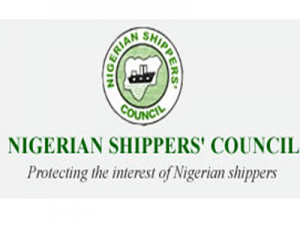NIGERIAN SHIPPERS’ COUNCIL As The Best Maritime Agency Of The Year
 Established in 1978, the Nigerian Shippers’ Council was primarily charged with the responsibility of protecting the interests of Nigerian shippers. This, it did through provision of adequate and up-to-date trade information to Nigerian importers and exporters as well as the international business and shipping community.
Established in 1978, the Nigerian Shippers’ Council was primarily charged with the responsibility of protecting the interests of Nigerian shippers. This, it did through provision of adequate and up-to-date trade information to Nigerian importers and exporters as well as the international business and shipping community.
The Council has also been given other responsibilities that are adjunct to the execution of its immediate mandate as the ports regulator in the nation’s maritime industry. One of such is the conceptualization of Inland Container Depots (ICDs) and Container Freight Stations (CFS) as well as Truck Transit Parks(TTP).
The Council was also the arrowhead of the creation and nurture of the Council for the Regulation of Freight Forwarding in Nigeria (CRFFN) and most recently, the reintroduction of the International Cargo Tracking Notes (ICTN) which was originally rejected by shippers due to the additional cost it added to cargo clearance process. But at its reintroduction under the management of the NSC the shipping lines are made to bear the cost of CTN thereby making it at no extra cost to the shipper
Specifically, the new role of NSC includes assessment of options for competition, deciding on entry rules, regulating pricing freedom and monitoring the outcomes. Effective regulation equally requires managing often complex interaction with the regulated firms, consumers, politicians, courts, the media, and a range of other interests. It is essential that the regulator provides a level playing field among the various actors. And the Council has lived up to this expectation.
The Regulator is expected to be independent, transparent, legitimate and credible, bearing in mind that the transition to a competitive market is a major regulatory challenge. It is also germane that the regulatory process is fair to all parties, by not taking arbitrary decision and by balancing the needs of stakeholders. Carrying everyone along, the involvement of stakeholders is an important source of legitimacy and public acceptability for the regulatory agencies and its decision-making procedures.
On appointment as the port economic regulator, the NSC met with all stakeholders, including freight forwarders, shipping agents, importers, private terminal operators, all of whom acknowledged the need to have an umpire to regulate activities of the various players.
As a follow up, the Council has also met and received the support of all other government agencies, including the Nigerian Ports Authority (NPA), whose managing director; Mallam Habib Abdullahi once affirmed that: “it would amount to failure on the part of NPA if the Nigerian Shippers’ Council fails”.
A study of all the agencies in the industry reveals that NSC is the only one whose management style can be likened to a tapestry of private sector craft of relentless moves at conquering barriers and taking on new challenges with the corporate vision clutched to the chest like the Bible or Quran.
This restlessness at ensuring orderliness and international best practices in the nation’s maritime industry, stirred the Council to berth the idea of the emerging New Port Order under which a Standard Operating Procedure(SOP) in the industry is being introduced. This will enthrone transparency and curb corruption substantially. All this implies that the Council is not only focused on its statutory responsibilities but has also taken on the challenge of oiling the wheels of other government agencies towards meeting their respective statutory duties, but within the confines of its permissible regulatory oversight briefs.
A glimpse of the New Port Order is no less enviable. Experts explain that it involves a situation where a cargo is scanned before it is stacked. As the ship is discharging, the cargo is also being scanned, and the image is used by the Nigeria Customs Service to commence clearing process in terms of segregating the cargo for whatever line of inspection, such as: green, yellow and red light, as the case may be.
Ironically, the terminal operators who have been up in arm against the Shippers’ Council are top beneficiaries of the emerging port order. Part of the benefits is the protection of their investments from undue interference. This on its own leads to guaranteed return on investment and increased profitability; predictability in processes and procedures; assurance of level playing ground; availability of Common User Information Service provided by the Regulator; strengthening of complaint and arbitration mechanisms, among other benefits.
Apart from the private terminal operators, the government will also enjoy improved revenue generation; improved infrastructural development; creation of efficient market; reduction in the of cost of doing business; improvement on the nation’s Global Competitive Index and consequent attraction of Foreign Direct Investment (FDI).
For the shipping companies, there will be an improved delivery of marine and terminal handling services leading to reduced turn-around time of vessel and reduced cost of vessel operations. There is also the benefit of improved image due to increased customer confidence; transparency, efficiency and effectiveness and consequent improvement in image. There is also the strengthening of complaint and arbitration mechanisms; prompt issuance of Ship Sailing Certificate and the consequent avoidance of demurrage accumulation against shipping companies and other effects.
For the freight forwarder, the system is ensuring professionalization of freight forwarding practice. This is aimed at elimination of touting, sanitizing the port environment; and harmonization of clearing processes and procedures and the consequent reduction of clearing charges. There is also the strengthening of complaint and arbitration mechanisms.
For the Nigeria Customs Service, the emergence of the new order translating to improved revenue collection, improved level of compliance by importers, exporters and freight forwarders, among others.
Above all, the ultimate beneficiaries are the consumers through the consequent reduction in cost and time of cargo clearing; reduction of cargo duel time, in particular, and generally the trade cycle; strengthening of complaint and arbitration mechanisms, etc.
When the new port order comes full on stream, providers of haulage services will also enjoy decongestion of port access roads leading to improved truck transit time at ports; there is also the ability of re-fleeting of rickety trucks; installment of electronic gating and call system guaranteed loading opportunity for truckers.
Now, the interesting and engaging side of the NSC story is that these feats were made manifest last fiscal year, 2015 with the least paid salary package among the government agencies in the industry yet the workers are highly motivated than others because the leadership is focused and goal-driven. And it did take the Minister of Transport, Rt.Hon. Rotimi Amaechi to notice the Council’s innovative efforts to make a difference, when he declared NSC the most organized and best government agency he had visited.







